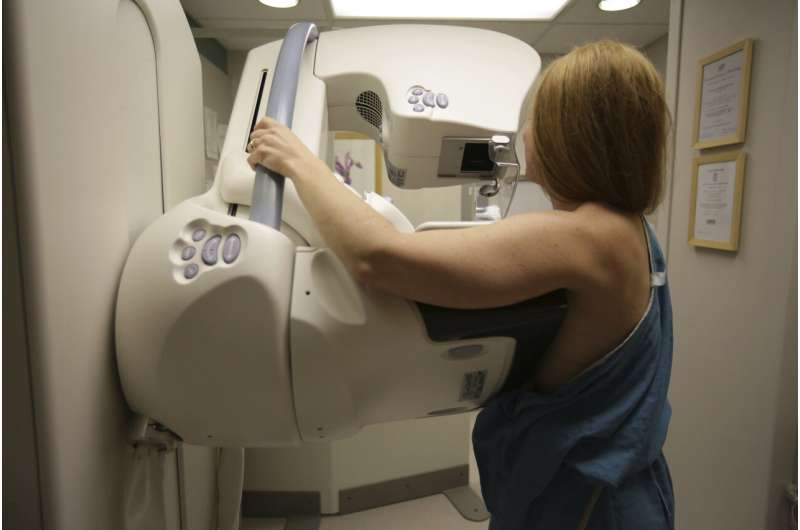
[ad_1]

In this May 22, 2015 photo, a woman undergoes a mammogram at the University of Michigan Cancer Center in Ann Arbor, Michigan. Two major studies, published on Wednesday January 20, 2021 by the New England Journal of Medicine, give a much more accurate picture of the inherited mutations that increase the risk of breast cancer in women without a family history of the disease, and of the frequency of these defective genes in the general population. Doctors say the results can help women make better decisions about screening, preventive surgery, or other steps. (Kimberly P. Mitchell / Detroit Free Press via AP, file)
Two large studies give a much more accurate picture of the inherited mutations that increase the risk of breast cancer in women without a family history of the disease, and the frequency of these defective genes in the general population.
Doctors say the results released on Wednesday by the New England Journal of Medicine can help women make better decisions about screening, preventive surgery, or other steps.
Although this type of genetic testing is currently not recommended for the general population, its use is increasing and many people are obtaining it from tests sold directly to consumers.
The new work shows that the risk conferred by certain genes “is very high,” wrote Mary-Claire King in an email. King, a scientist at the University of Washington, played no role in the new studies, but discovered the first breast cancer predisposition gene, BRCA1.
“The lives of many women could be saved if all women had the opportunity to learn if they carry mutations in these genes before being diagnosed with cancer,” she writes.
The American Cancer Society estimates that 276,000 new cases of breast cancer were diagnosed in the United States last year. The new work suggests that at least 13,800 of them occur in women with inherited genetic mutations that increase their risk of developing the disease.
Much of what has been known about hereditary risk so far has come from studies of women with a family history of breast cancer or unusual situations such as contracting it at a very young age. There has also been little work on specific mutations in these genes and the extent to which each affects the chances of developing disease. The new studies fill some of these gaps.
One was led by Fergus Couch, a pathologist at the Mayo Clinic and included researchers from the National Institutes of Health, who sponsored the study with the Breast Cancer Research Foundation.
They looked for mutations in 12 genes linked to breast cancer in more than 64,000 women, about half with the disease and the other half without it, bringing together the results of studies conducted across the United States, including including some in specific minority groups such as blacks.
They found troublesome mutations in about 5% of women with the disease and in 1.63% of the comparison group.
“Now we realize that 2% of women walking around the United States might have mutations in these genes,” Couch said.
There was no difference between racial groups in the likelihood of having a mutation overall, but some mutations were more common in some groups. For example, black women were more likely to have cancers linked to “triple negative” cancers – tumors that are not fueled by estrogen or progesterone, or the gene targeted by the drug Herceptin.
The study also found that having a mutation in the BRCA1 gene increased the risk of developing breast cancer almost eight-fold, and in the BRCA2 gene, more than five-fold.
Conversely, another gene was considered to be of great concern, but “what we found is that it is really low risk … people really shouldn’t act on it,” Couch said. .
Actions could include more frequent mammograms or other screening tests, removal of breasts or ovaries, screening of family members, or other steps.
With the new work, “we’re providing more accurate risk estimates” to guide such decisions, Couch said.
The second study by researchers at the University of Cambridge in England looked at 34 genes in women across the UK, Europe, Australia and Asia – around 60,000 with cancer of the breast. breast and 53,000 similar without it.
“They found what we found” – an increased risk of certain genes and a similar prevalence of those in the general population, Couch said.
Researchers recommend that all women diagnosed with breast cancer under 66
Breast cancer risk genes – Analysis of associations in more than 113,000 women, New England Journal of Medicine (2021). DOI: 10.1056 / NEJMoa1913948
Chunling Hu et al. A study based on the population of genes previously involved in breast cancer, New England Journal of Medicine (2021). DOI: 10.1056 / NEJMoa2005936
© 2021 The Associated Press. All rights reserved. This material may not be published, broadcast, rewritten or redistributed without permission.
Quote: New Studies Clarify Which Genes May Increase Breast Cancer Risk (2021, Jan 21) Retrieved Jan 21, 2021 from https://medicalxpress.com/news/2021-01-genes-breast-cancer.html
This document is subject to copyright. Apart from any fair use for study or private research, no part may be reproduced without written permission. The content is provided for information only.
[ad_2]
Source link